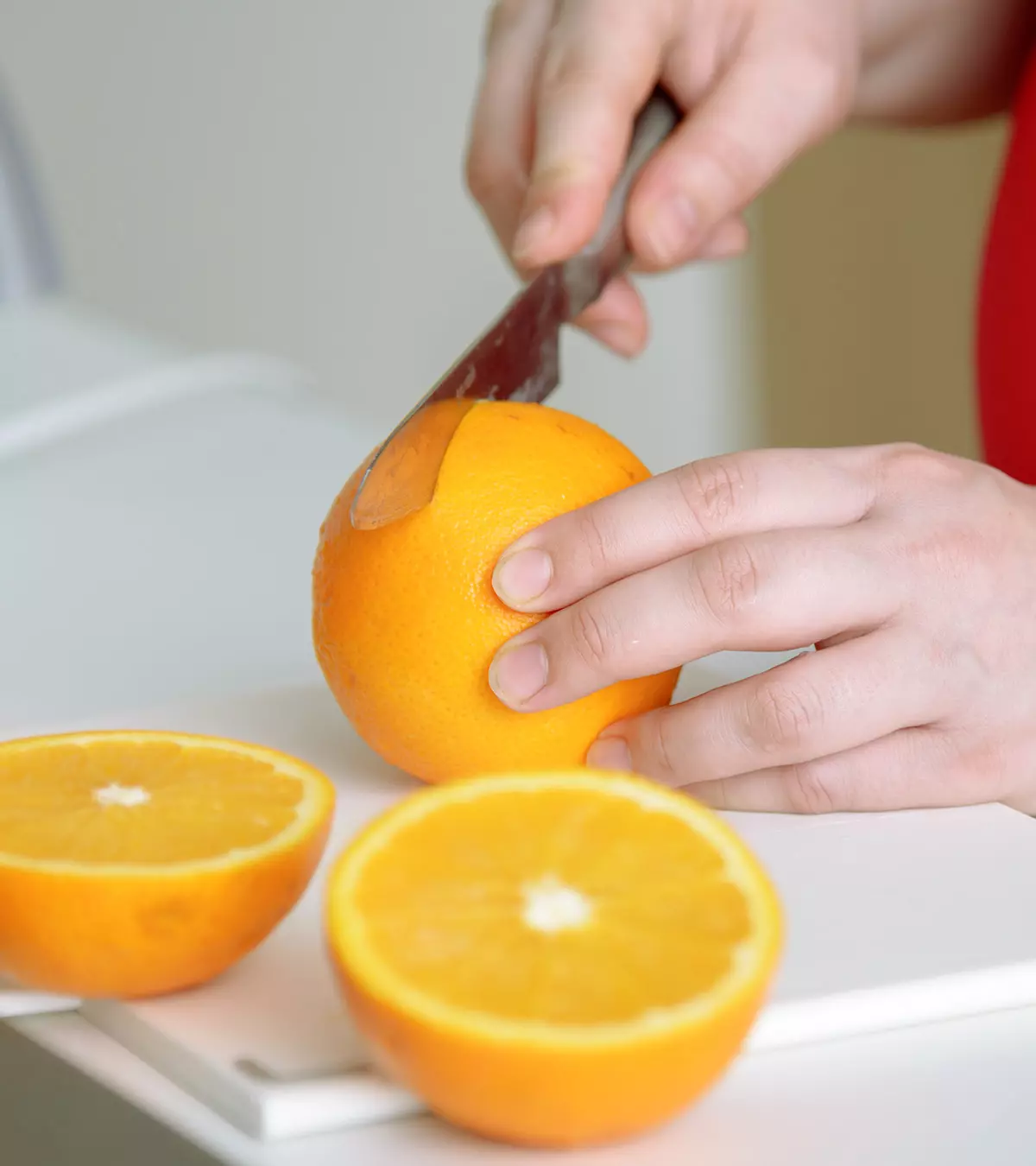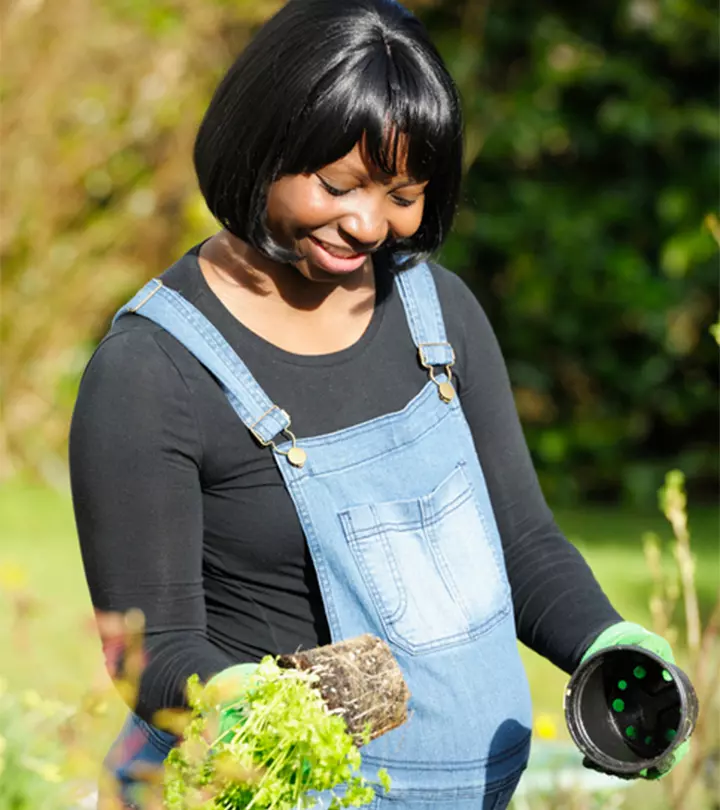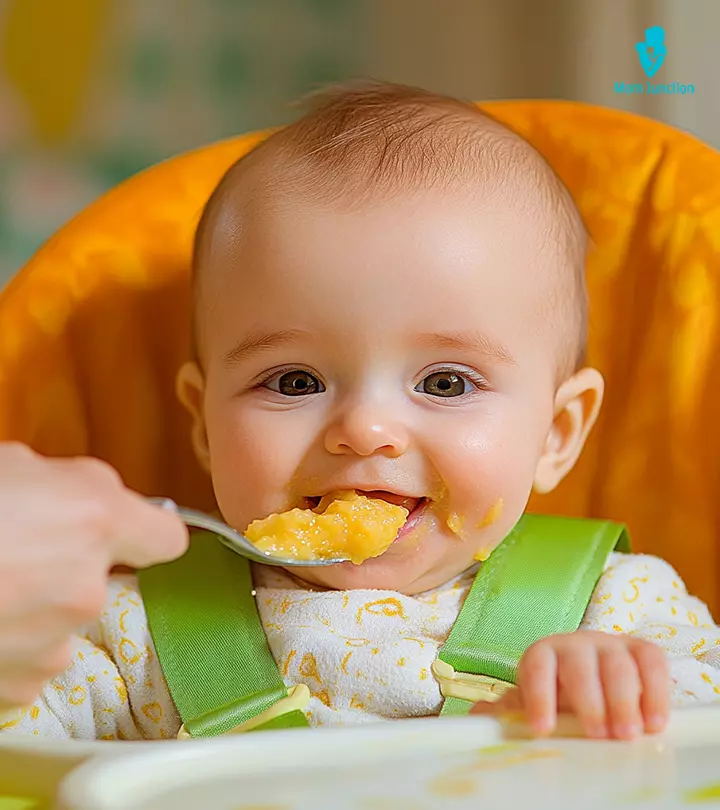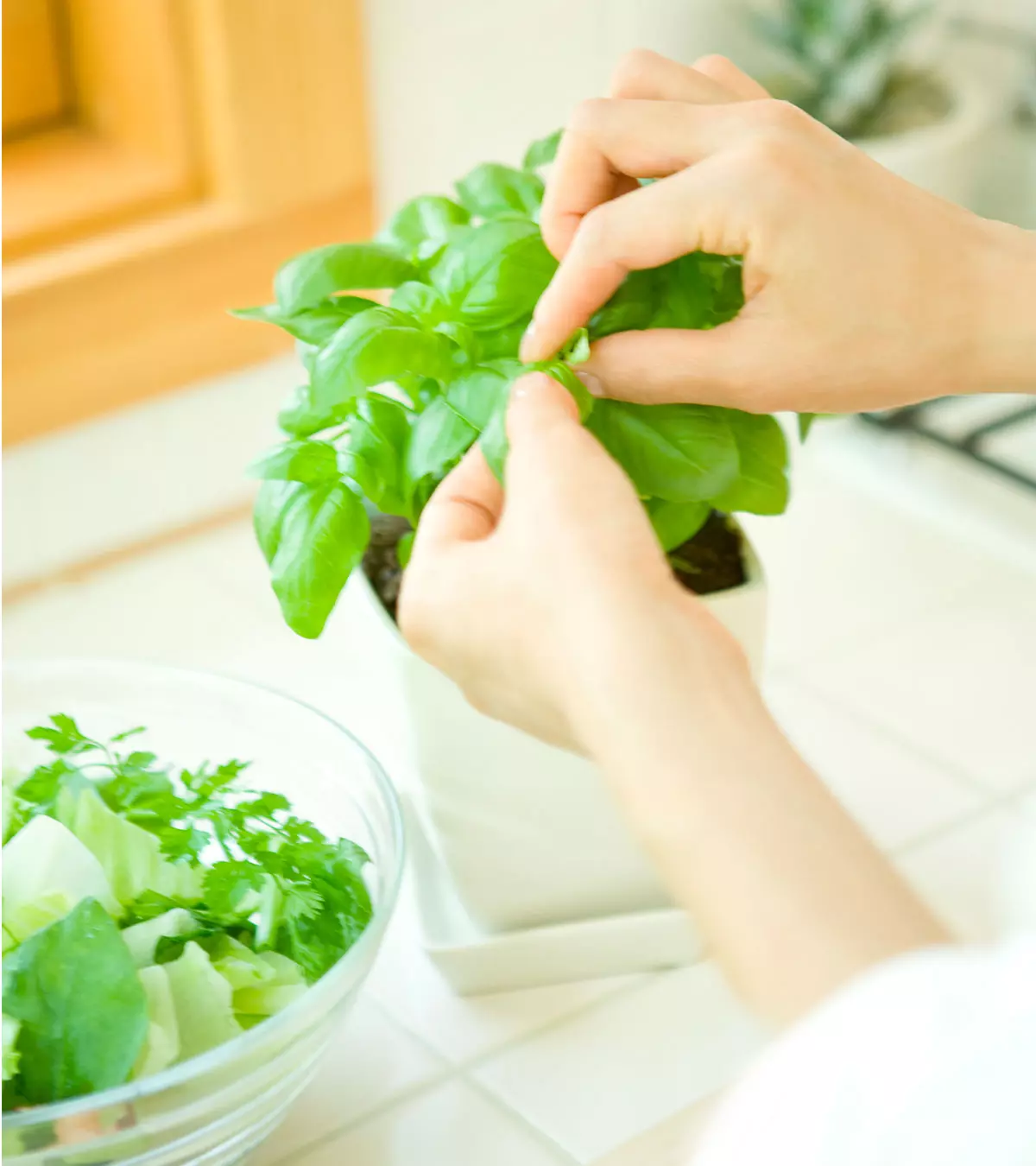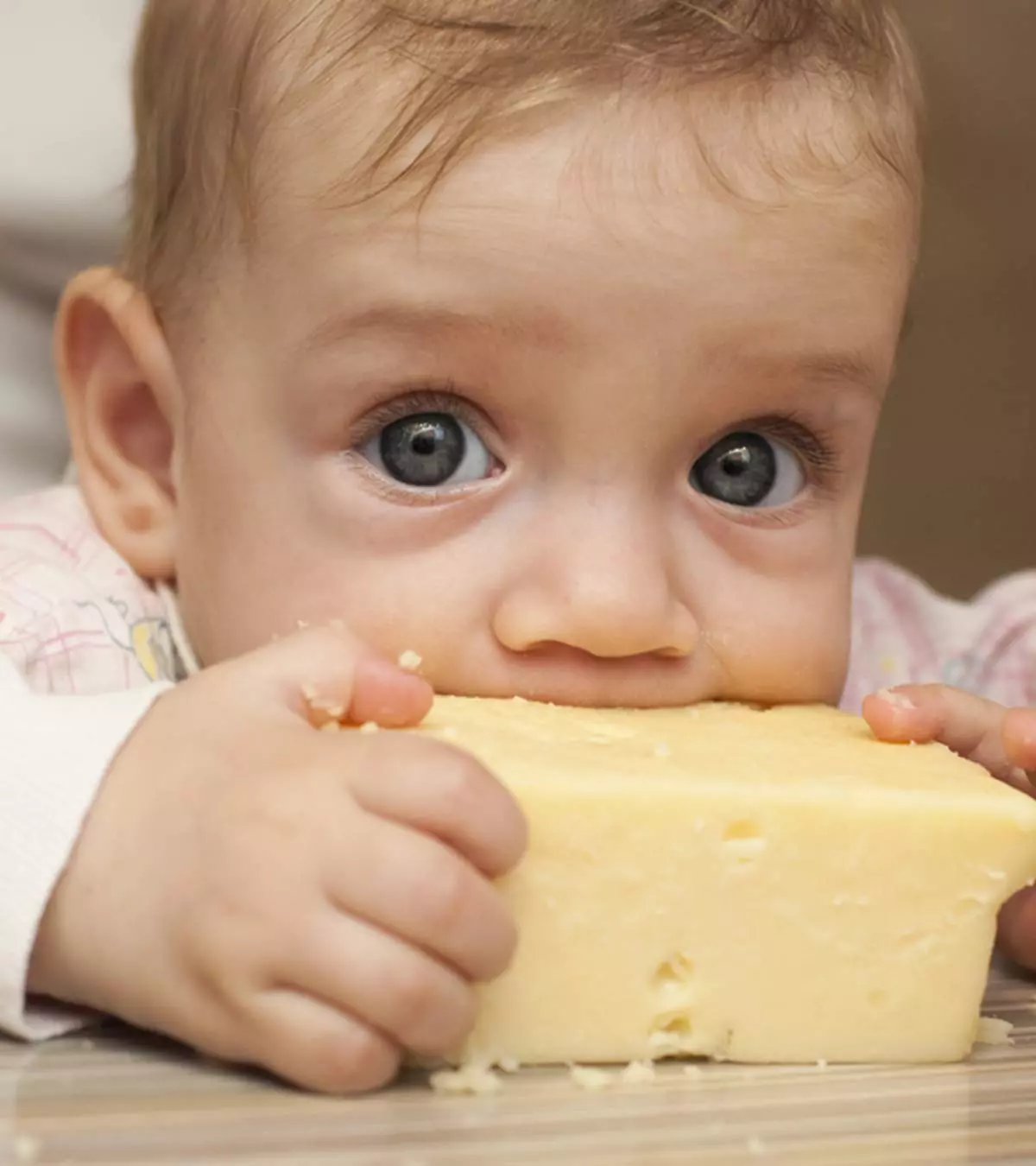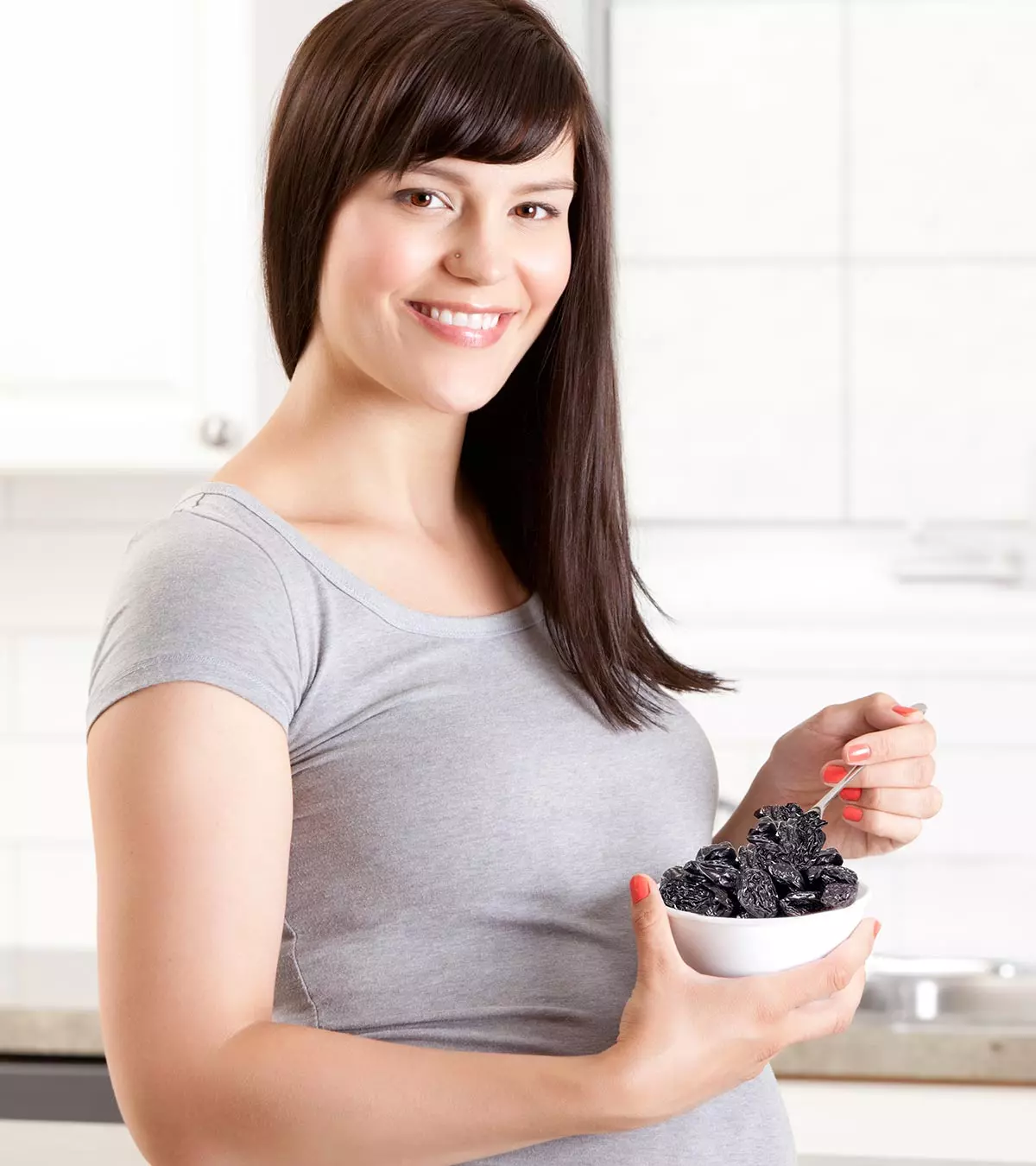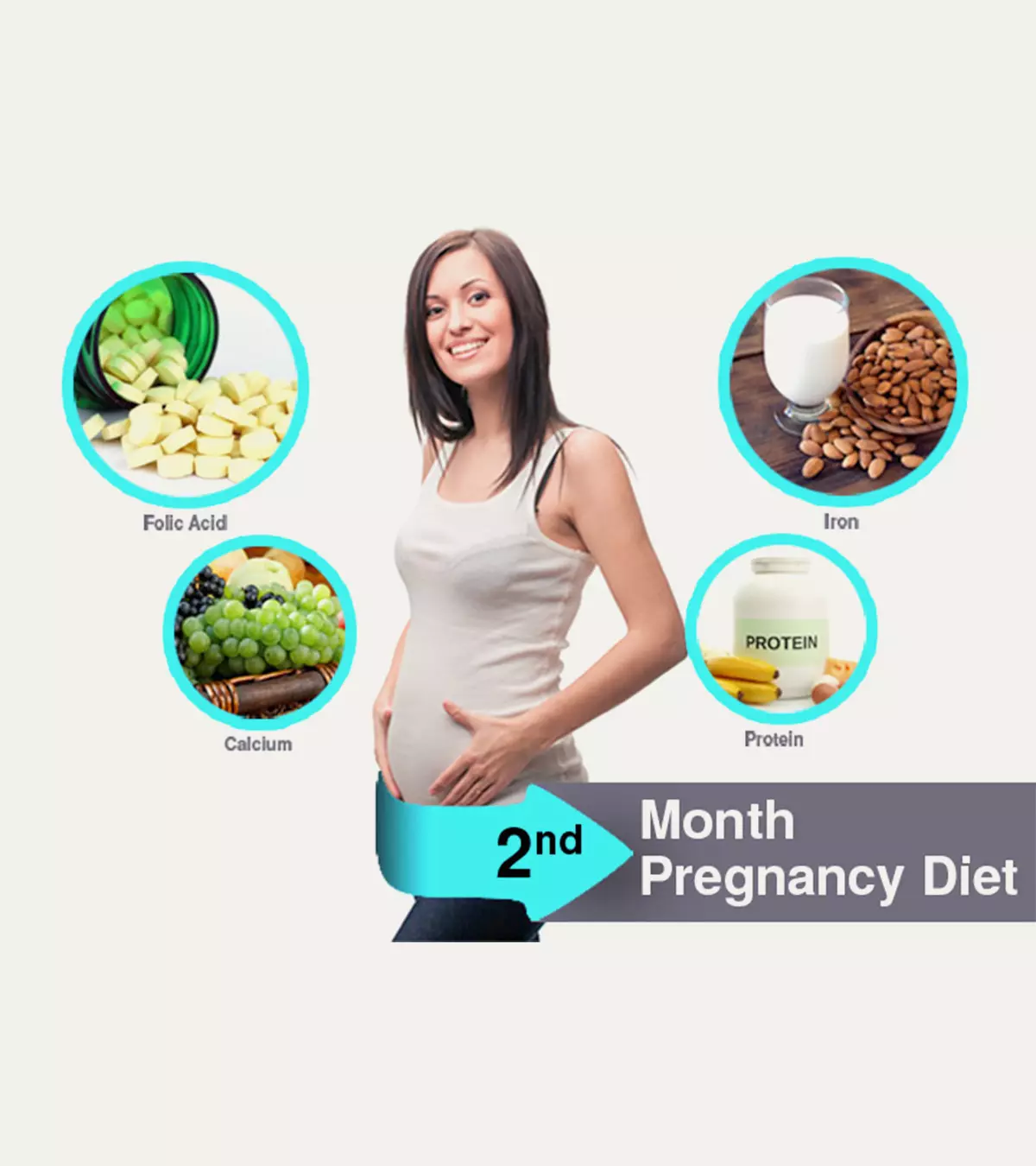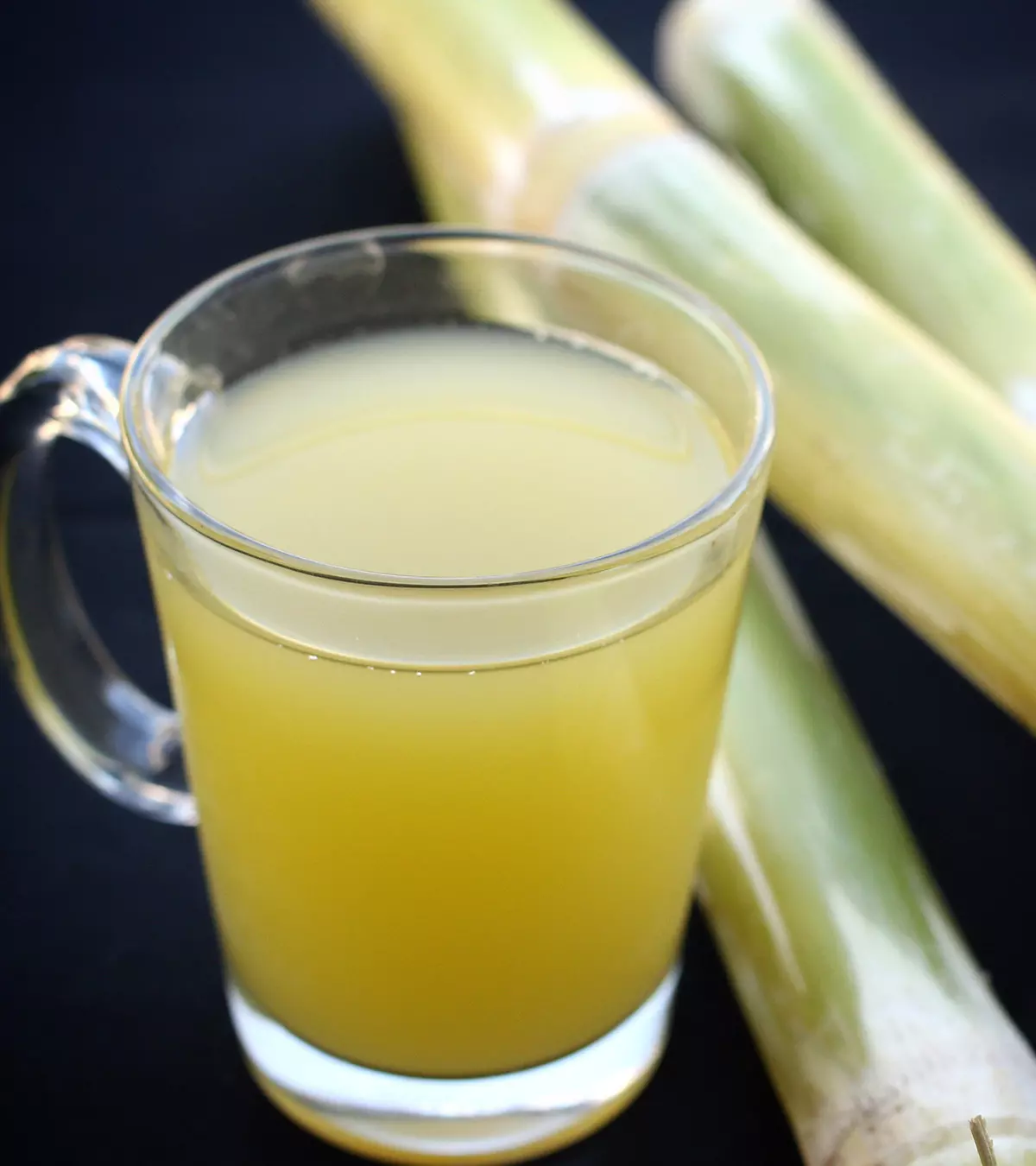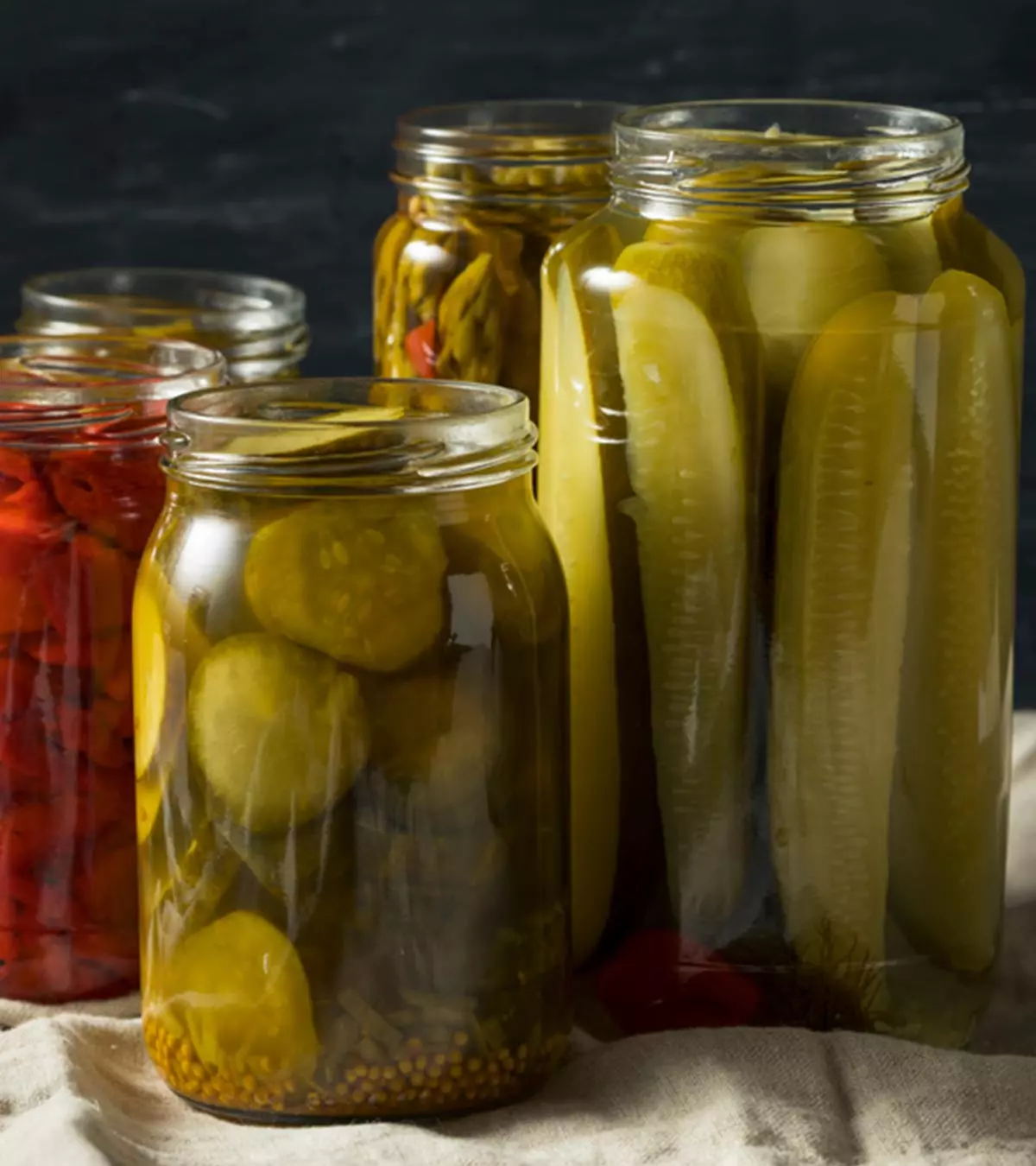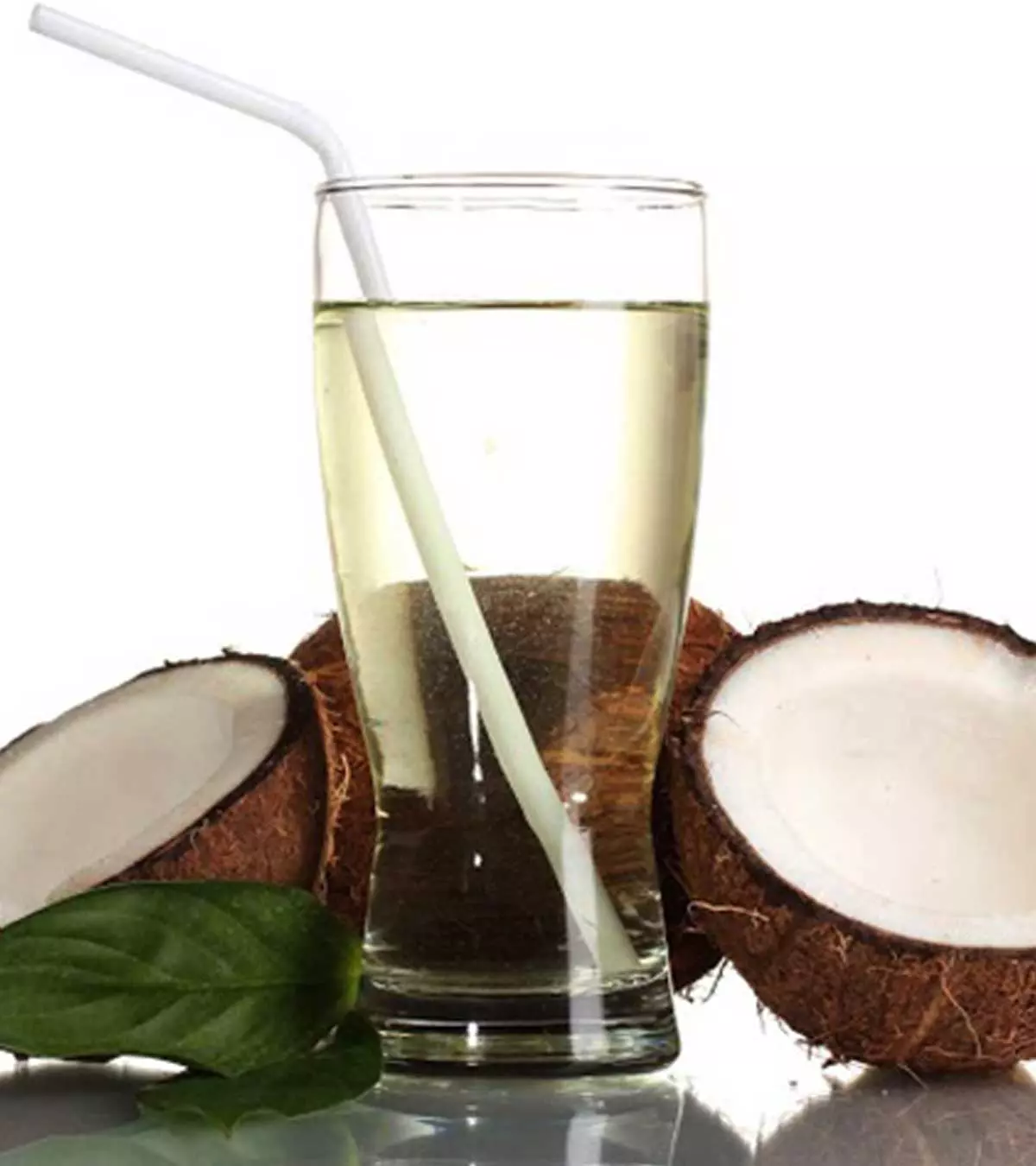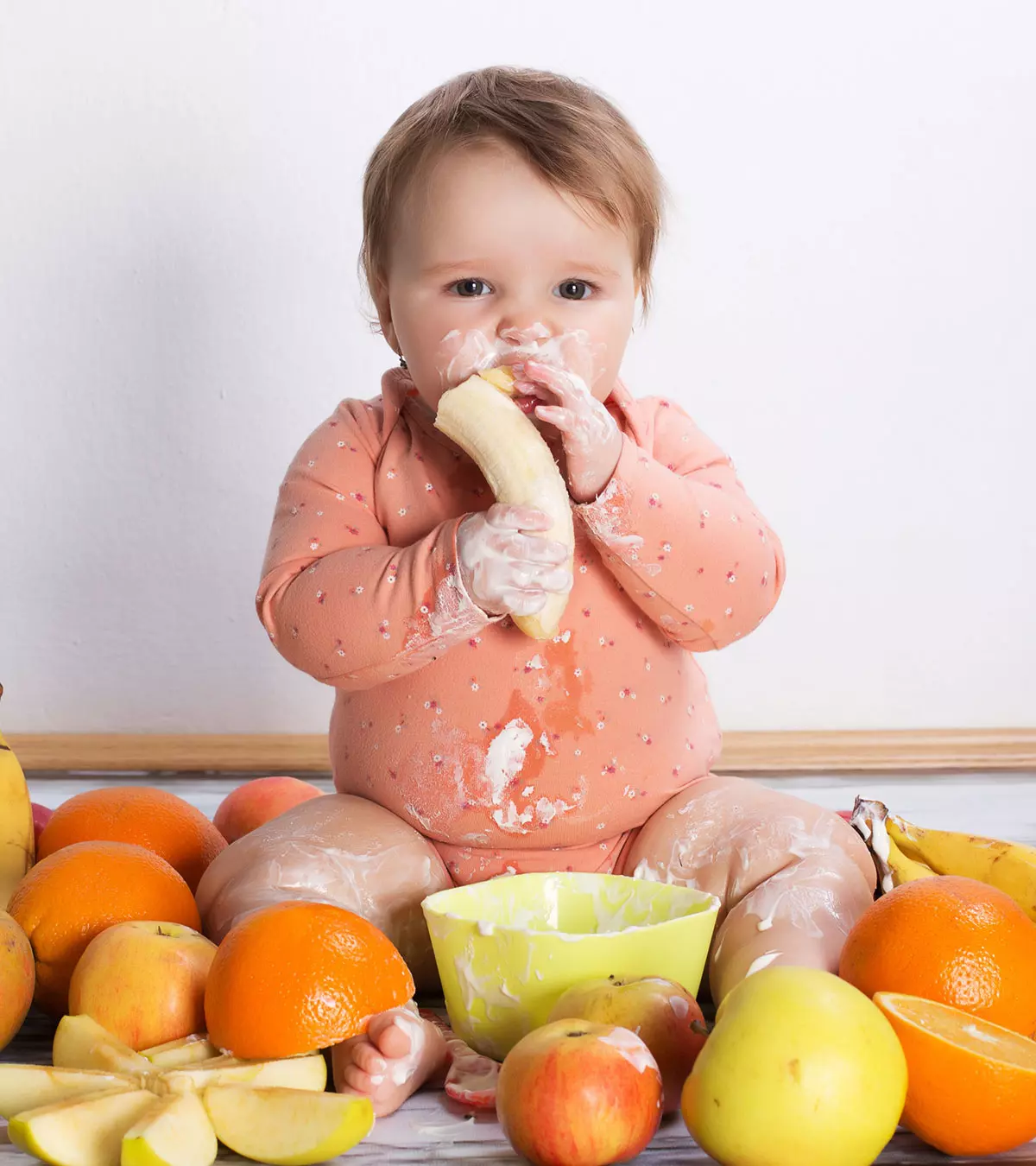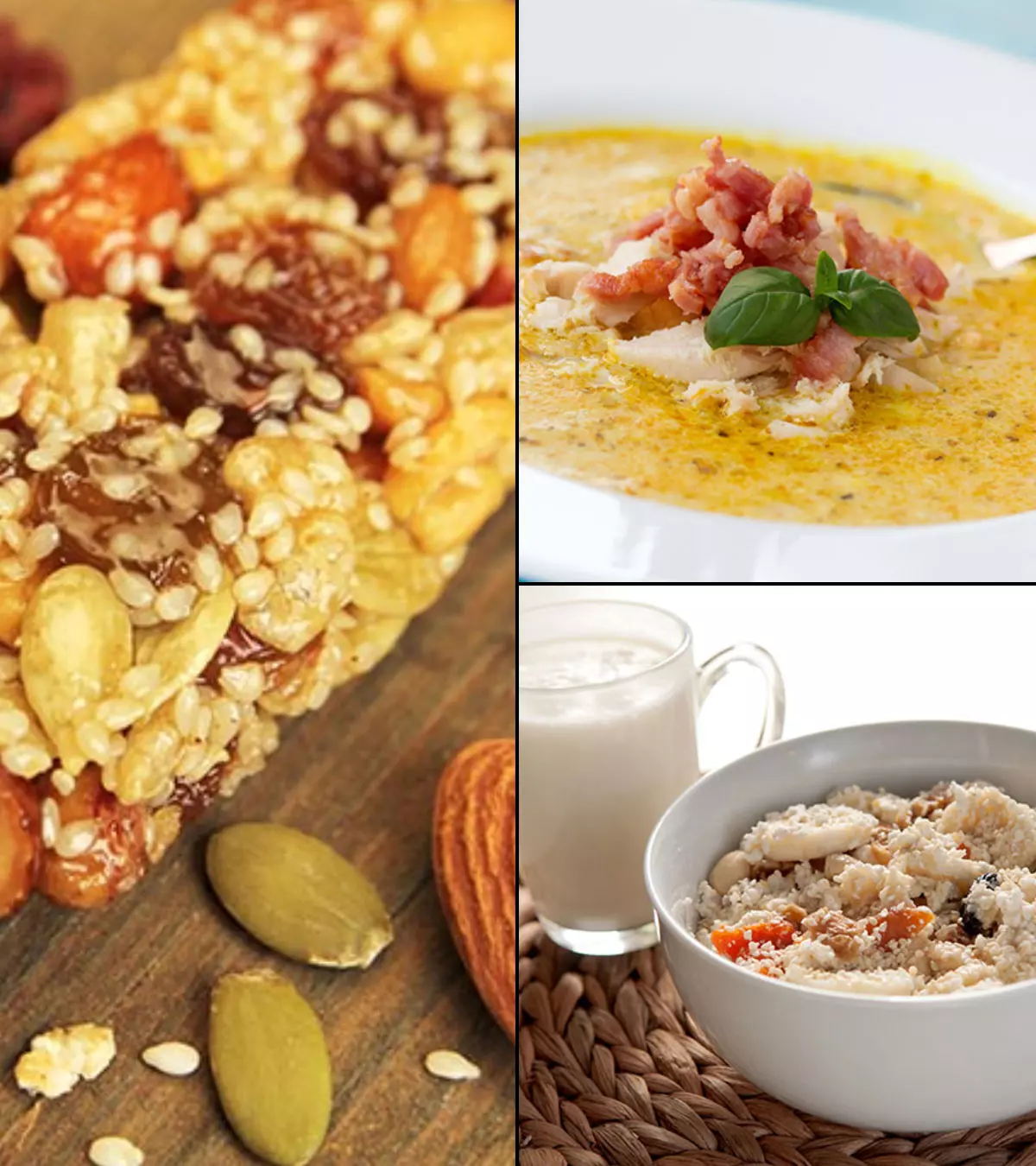
Image: Shutterstock
Dry fruits refer to dried fruits and nuts. While the fruits are dried and shrunk after dehydration, the nuts are naturally found inside hard shells. Both are nutrient-rich that can benefit your health. Thus, dry fruits for babies seem a healthy choice to support infant nutrition for proper growth and development. But since some dried fruits and nuts can cause allergic reactions, it is important to know if feeding dry fruits is safe for babies. Read on as we tell you more about the right age to feed dry fruits to babies, their possible health benefits, side effects, and dry fruit recipes that are worth a try.
Key Pointers
- Dried fruits can be a choking hazard for babies, leading to safety concerns.
- Cooked dried fruits are safe for consumption by babies starting at six months old.
- Dried fruits offer health benefits to babies such as enhanced digestion, strengthened immunity, and improved bone health.
- However, dried fruits may also negatively impact weight-related health issues in babies.
- To prevent potential health risks, it is essential to take precautions such as soaking and limiting intake of candied fruits when serving dried fruits to babies.
Are Dried Fruits (Seeds and Nuts) Safe For Babies?
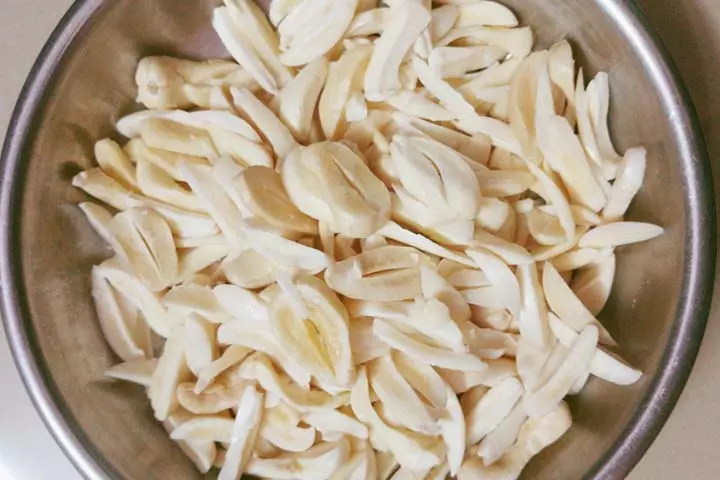
Dried fruits can be considered safe for babies. However, you need to be careful while feeding them to a baby due to their potential choking hazard (1). Thus, it is good to serve dried fruits in an age-appropriate manner.
For babies under one year, you can serve it in cooked, mashed, or pureed forms. Babies older than a year can be served thinly sliced and finely chopped dried fruits. It’s worth noting that according to a report by the New York State Department of Health, choking is the fourth leading cause of unintentional death in children under the age of five. Food-related incidents also account for the most common cases of nonfatal choking in young children.
 Quick tip
Quick tipWhen To Start Feeding Dried Fruits For Babies?
Cooked dried fruits can be introduced to babies once they are six months old (2). It is the age when babies start eating solids and also have a well-developed gag reflex. But just like any new food, talk to a pediatrician before introducing dry fruits.
Potential Health Benefits Of Dried Fruits For Babies
Dried fruits are rich in fiber, certain vitamins, minerals, enzymes, and bioactive compounds like polyphenols (3)
. The vast nutritional composition makes dried fruits health-promoting. Below are some health benefits of dried fruits on regular consumption and in moderate amounts.
- Nutrient-dense: Dried fruits are energy and nutrient-dense foods that help meet the overall nutritional needs of an infant. A few dried fruits that can boost your baby’s nutrient intake are apricots, figs, and dates.
- Optimum micronutrient supply: Dried fruits have a good composition of micronutrients. Their regular consumption in moderate amounts could supply essential micronutrients such as vitamins A, B3, E, potassium, magnesium, iron, and folate (4). These micronutrients ensure support for the development of babies.
- Digestive health: Dried fruits are considered rich in dietary fiber that helps in managing digestive health. Prune juice in specific has been used in traditional and modern medicine to treat and manage constipation in infants (5) (6).
- Gut microbiota: Dried fruits such as raisins could support the development of intestinal microflora (7). This property of raisins is attributed to the presence of fermentable fiber such as inulin and phytochemicals such as phenolic acids and tartaric acid, which acts as prebiotics (food for gut bacteria). Some other dried fruits that hold similar potential are prunes, dates, and figs (8).
- Immunity: Strengthening the immune system is vital for infants as they are vulnerable to infections until the age of two years. Dried fruits are rich in micronutrients and bioactive compounds that are known to possess anti-inflammatory and antioxidative properties (9). These properties help boost your infant’s immunity when dried fruits are consumed regularly.
- Anemia: Babies are vulnerable to anemia, especially between nine and 24 months (10). You can supplement your infant’s diet with dried fruits, such as raisins, prunes, and apricot, which are good sources of dietary iron.
- Bone health: Dried fruits such as prunes or dried plum have shown positive effects on maintaining bone health. The bone protective effects of prunes are attributed to the presence of micronutrients, such as vitamin K, manganese, boron, copper, and potassium (11) (12).
- Weight management: Dried fruits provide essential nutrients without excessive calories when consumed in moderation.

Possible Health Risks Of Dried Fruits For Babies
There are some health risks of dried fruits that must be kept in mind while you plan to feed them to your baby.
- Weight-related health issues: Dried fruits are rich in natural sugars like glucose and fructose. The small size of the fruits can increase the risk of overconsumption. Excess sugar intake, in the long run, is associated with several health concerns such as obesity (13).
- Candied fruits: Certain whole fruits, like apple, pineapple, strawberries, and blackcurrant, are also processed to form dried fruits. These fruits are preserved in sugar solution due to which they are also called “candies.” Babies should have fewer servings of candied fruits, which are often confused with regular dried fruits (4). Limit the intake of candied fruit to not more than one to two servings a week. Excess intake could lead to dental issues in infants (3). Also, babies might get used to the sweet taste and refuse to eat fresh fruits.
- Gastrointestinal disturbances: Dried fruits are rich in dietary fiber. Thus, if consumed in excess, they could lead to gastrointestinal disturbances such as stomach cramps, bloating, gas, constipation, or even diarrhea (3).
- Allergy: Dried fruits are often preserved with the help of sulfites. Sulfites are regulated food additives that are used to preserve the color of certain dried fruits, such as raisins. Sulfites could cause allergic reactions (14). Therefore, check the label while purchasing dried fruits. Purchase dried fruits that are brown or grey in color and are preferably organic.
- Toxin contamination: Improperly stored dried fruits can be susceptible to contamination from fungi such as Alternaria, Penicillium, and Aspergillus. These fungi could release mycotoxins, which are harmful and even fatal (15). Check the date of packaging on a packet of dry fruit, and also buy them from reliable sellers.
 Point to consider
Point to considerIt is also good to take precautionary steps.
Precautions To Take While Feeding Dried Fruits To Babies

Below are some precautions that you must take while feeding dried fruit to your baby (16).
- Buy packaged, organic dried fruits from a reputable store.
- Buy shade-dried fruits whenever possible. Check with the manufacturer about the method of drying before the purchase.
- Dried fruits are available in two forms – semi-moist and dry. Prefer semi-moist forms to completely dry, hard-to-eat alternatives.
- After purchase, keep the dried fruits in an air-tight container in a cold place, away from light.
- Check for possible allergies that a specific dried fruit could cause. It is important if your baby has any other allergy.
- Dried fruits have high amounts of natural sugars. Therefore, practicing portion control is vital. Do not feed more than a single serving a day.
- Dried fruits are rich in fructose, a natural sugar present in fresh fruits as well. Babies with fructose intolerance must avoid dried fruits as they could cause gastrointestinal disturbances (17).
- Always feed cooked, mashed, or pureed dried fruits to babies under 12 months of age. If you intend to serve dry fruits as finger food to an older baby, then chop the fruits in pieces that are easy to chew for the baby.
Precautionary steps allow the baby to enjoy dry fruits with little to no risks. Did you know you can also serve the dry fruits in powdered form?
Dry Or Dried Nut Powder Recipe
Powder made up of different dried fruits and nuts is ideal to use for babies. Since this powder contains a variety of dry fruits, it is considered nutrient-dense and apt for babies who cannot eat whole dried fruits.
You will need:
- ½ cup almonds
- ½ cup pistachios
- ½ cup cashews
- ¼ cup or 20g walnuts
- 2tbsp lotus seeds
- 1tsp cardamom powder
How to make:
- Take a flat bottom pan and put it on medium heat.
- As the pan heats, add lotus seeds or makhana, walnuts, cashews, and almonds to it. Dry roast everything, and once done, keep them aside to cool.
- Once cooled, put everything in a blender with pistachio and cardamom powder. Blend until you get a fine powder. Ensure no lumps or thick pieces are left behind.
- Store the powder in an air-tight container and put it in the refrigerator. Use it within a month.
- You can add this powder to almost any recipe, like porridge, pancakes, or make shakes with formula.
Dry Fruit Recipes For Babies
Below are some simple yet nutritionally wholesome dried fruit recipes that you can try for your baby.
1. Oats and dried fruit porridge

This recipe can be added to your infant’s breakfast plan. It has high-fiber oats with dried fruits, a source of micronutrients and bioactive compounds.
You will need:
- 1 cup rolled oats
- ½ cup dried fruit powder
- 1tsp jaggery or raisin puree
- Water
How to:
- Wash the rolled oats in the running water.
- Take a flat bottom pan and add three cups of water.
- Once the water starts to boil, add dry fruit powder and oats to it.
- Cook on a medium flame for two to three minutes. As the mix starts to bubble, lower the flame and cook on simmer for another two to three minutes.
- Pour the porridge in a serving bowl. Mix jaggery powder or raisin puree and mix well.
- Serve it hot or let it cool.
 Quick tip
Quick tip2. Dried fruit bar
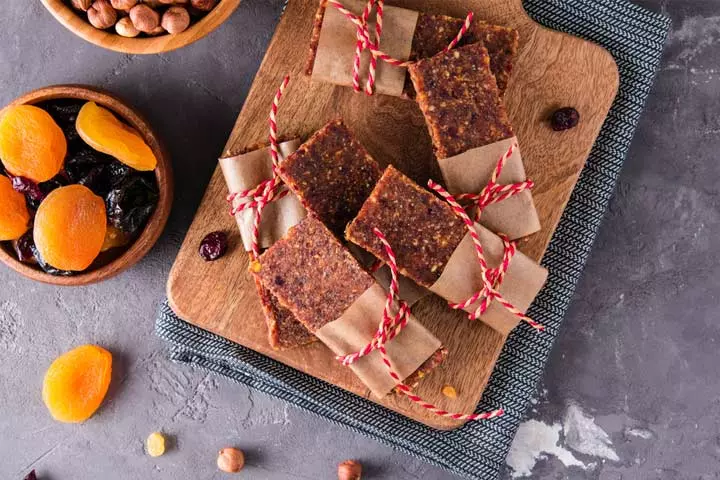
This is a simple finger food recipe, ideal for babies who have started chewing. The recipe has a variety of dried fruits added together in a bar. It can be served to babies as a midday snack or as an evening snack with formula or cow’s milk (for babies older than 12 months).
You will need:
- 16oz (453g) dried fruits and nuts (almonds, walnuts, figs, apricots, prunes, raisins, and pistachio)
- 3-4 cups water
How to:
- Chop the dried fruits into small pieces and put them in a pan.
- Now add three to four cups of water into the pan and bring it to boil.
- Cook the fruits and nuts for 10-15 minutes or until they turn tender.
- Meanwhile, preheat the oven to 225°C (433°F) and prepare your baking sheet.
- Once the fruits are cooked, drain the water and blend the fruit pieces to make a smooth puree.
- Spread this puree on the baking tray and put the tray into the oven. Bake for 35 minutes.
- Once done, take out the tray and let it cool.
- Cut the bar into different shapes and serve.
To make it more crunchy and nutritious, you may add macadamias, coconut flakes, or some preservative-free organic fruits that your baby loves.
3. Fruit and nut smoothie
Here’s a fun and easy-to-digest smoothie recipe to provide essential nutrients to your baby who has just started solid foods.
You will need:
- 3 cups milk
- 8 almonds
- 8 pistachios
- 8 cashews
- 2 figs
- 8 raisins
- 5 dates
- 2 tbsp brown sugar/jaggery
- Saffron
- Cardamom powder
How to:
- Soak the saffron in one tablespoon of milk and keep aside.
- Soak all the nuts in warm water for at least 30 minutes.
- Add saffron, sugar, and nuts to one cup of milk.
- Grind them into a smooth paste and add two cups of milk.
- Blend for 30 seconds.
- Pour the smoothie into glasses and serve.
Frequently Asked Questions
1. Can I give Pista (pistachio) to my baby?
Yes, you can give unsalted pistachio to your baby unless they are allergic to tree nuts. Pistachios are low in fat and contain high amounts of vital nutrients, such as vitamin A, B1, C, K, B6, copper, and magnesium (18). You can add finely powdered pistachio to different baby foods. Alternatively, you can add pistachio paste to nut butter and use that butter as a spread on toasted bread and crackers. Nuts for babies are a great source of healthy fats and essential micronutrients that can contribute to a baby’s daily nutritional requirements.
2. Which dry fruits should be soaked in water?
Generally, almonds, walnuts, and cashew nuts are recommended to be soaked in water to reduce their phytate content, and increase the absorption of nutrients, especially minerals. However, recent studies indicate that soaking doesn’t enhance nutrient absorption (19).
3. Are dried fruits better for babies than fresh fruits?
Dried fruits are high in nutrients and count towards the daily fruit recommendation. However, unlike fresh fruits, they have a higher concentration of calories and sugar. Therefore, one has to be mindful of the portion size when feeding them to the baby (21).
4. Is it safe to give dried fruit to a baby with a family history of food allergies?
Yes, it is safe to give dried fruit to a baby with a family history of food allergies after four to six months of age, according to current evidence and WHO advice (22).
5. Which dry fruits are used for brain development?
Almonds, pumpkin seeds, walnuts, hazelnuts, and peanuts are dry fruits (fruits, seeds, and nuts) that support brain health as they contain nutrients such as fiber, PUFAs, antioxidants, and minerals that aid brain function. Raisins for babies is another nutritious dry fruit that can contribute to their brain development.
Dry fruits for babies can provide a nutritious option for their meals and snacks. These are excellent sources of protein, antioxidants, calcium, and minerals that help a baby’s overall growth and development. However, check for any allergic reaction from the potential dried fruit allergens and ensure to feed them in an easily chewable form such as puree or powdered form to prevent babies from choking on it. As long as dry fruits are fed in limited quantities and with necessary safety measures, it is a healthy ingredient to include in their meals.
Infographic: Useful Tips For Feeding Dried Fruits To Babies
When introducing foods into your baby’s diet, you need to take certain precautionary measures. This is because even nutrient-dense foods can harm the baby when not fed properly. So, keep this infographic handy if you’re planning to give dried fruits to your little one. It includes safety tips that you must follow. Illustration: Momjunction Design Team
Illustration: Amazing Health Benefits Of Dry Fruits For Babies
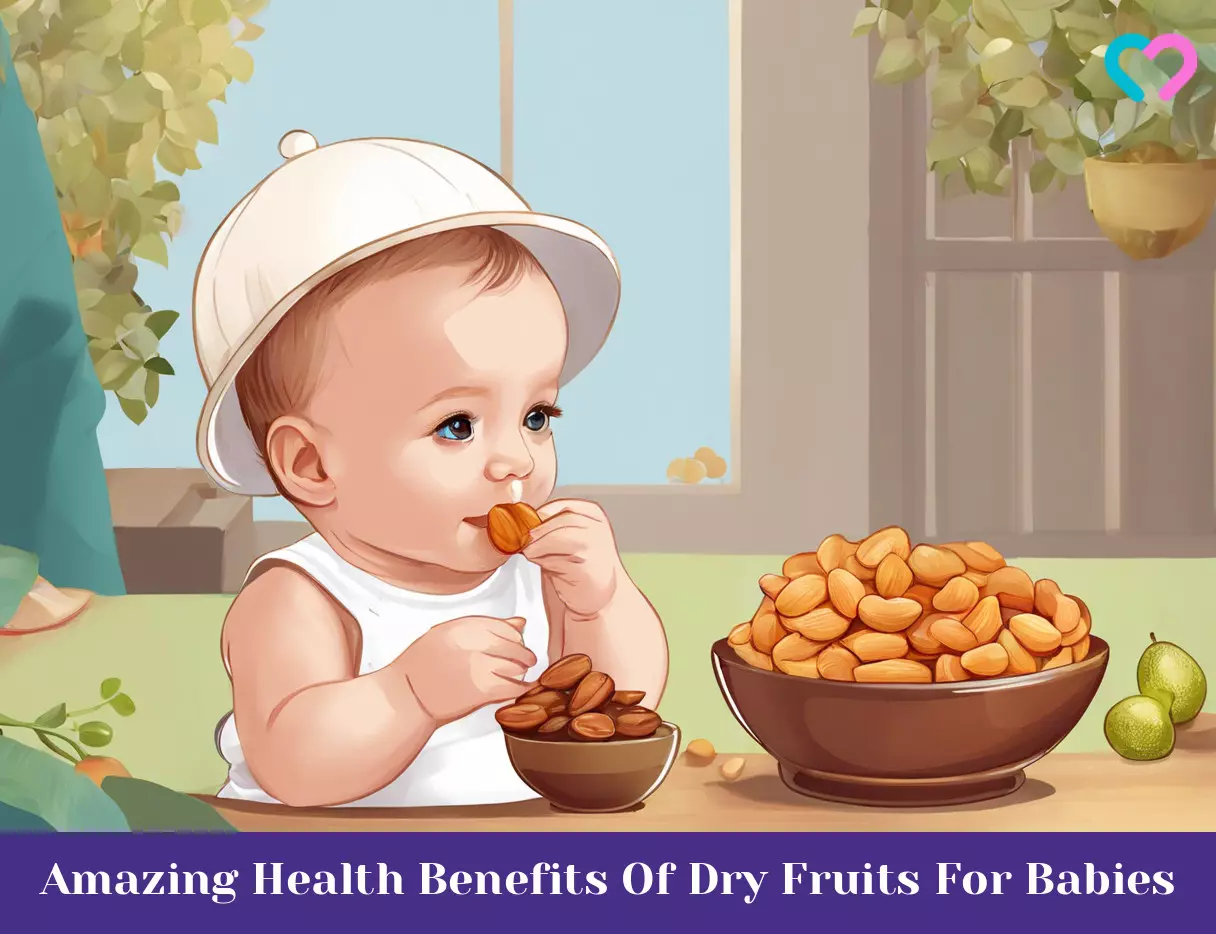
Image: Stable Diffusion/MomJunction Design Team
Check out these 6 delightful recipes utilizing baby food and weight-gaining powder to support brain development, strengthen bones, and promote healthy weight gain for your baby.
References
1. Choking Hazards; Centers for Disease Control and Prevention
2. Vegetarian feeding guide for babies and toddlers; Pregnancy birth & baby
3. Khan Sohaib A et al., Dry Fruits and Diabetes Mellitus; International Journal of Medical Research and Health Sciences
4. Desislava krasteva Gyurova et al., Dried fruits – brief characteristics of their nutritional values. Author’s own data for dietary fibers content; Researchgate
5. The Advantages of Eating Dried Fruits and Nuts; Ministry of Health, State of Israel
6. Infant Constipation; Healthy Children; American Academy of Pediatrics
7. Akemi T. Wijayabahu et al., Dietary raisin intake has limited effect on gut microbiota composition in adult volunteers; Biomed Central
8. Pablo Hernández-Alonso et al.; Nuts and Dried Fruits: An Update of Their Beneficial Effects on Type 2 Diabetes; NCBI
9. Kundu JK and Chun KS; The promise of dried fruits in cancer chemoprevention.; National Center For Biotechnology Information
10. Anemia caused by low iron – infants and toddlers; MedlinePlus; U.S. National Library of Medicine
11. Taylor C. Wallace; Dried Plums, Prunes and Bone Health: A Comprehensive Review; National Center For Biotechnology Information
12. Jennette Higgs et al., Nutrition and osteoporosis prevention for the orthopaedic surgeon; National Center For Biotechnology Information
13. Is eating dried fruit healthy?; Harvard Health Publishing
14. Sulphites; Government of Canada
15. Dizhe Wei et al., Survey of Alternaria Toxins and Other Mycotoxins in Dried Fruits in China; National Center For Biotechnology Information
16. Dried Fruit; FAO
17. Fructose-Restricted Diet; UW Health
18. M. Bulló et al.; Nutrition attributes and health effects of pistachio nuts; Cambridge University Press
19. Common Myths About Nuts and Dried Fruits; International Nut And Dried Fruit Council
20. Processed dried fruit snacks for young children; First Steps Nutrition Trust
21. About The Buzz: Fresh Fruit Is Much Healthier Than Dried Fruit?; Have A Plant
22. Solid Food Introduction and the Development of Food Allergies; NIH
Community Experiences
Join the conversation and become a part of our nurturing community! Share your stories, experiences, and insights to connect with fellow parents.
Read full bio of Jyoti Benjamin
Read full bio of Swati Patwal
Read full bio of Rohit Garoo
Read full bio of Anindita Ghatak





